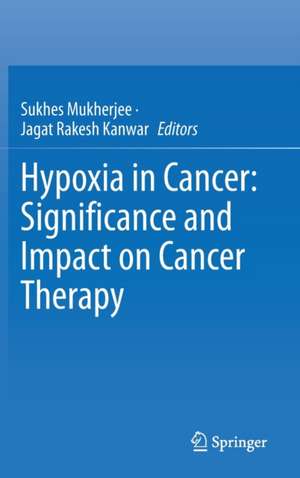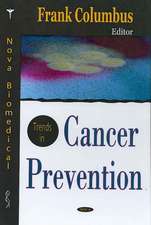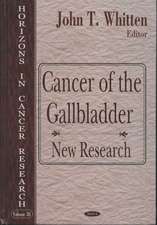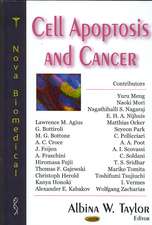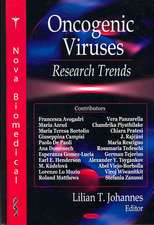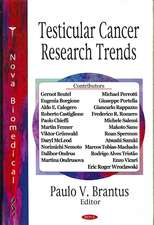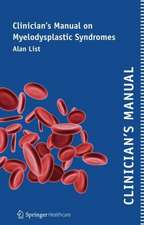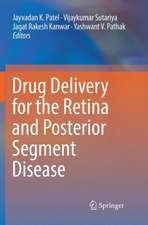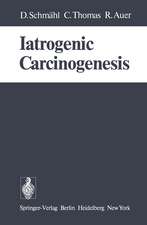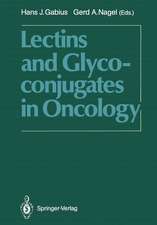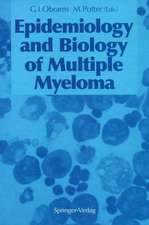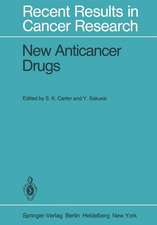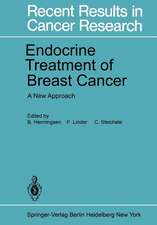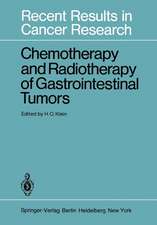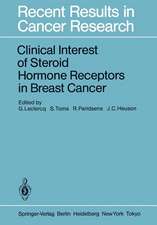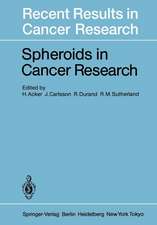Hypoxia in Cancer: Significance and Impact on Cancer Therapy
Editat de Sukhes Mukherjee, Jagat Rakesh Kanwaren Limba Engleză Hardback – 15 apr 2023
Preț: 1425.97 lei
Preț vechi: 1501.03 lei
-5% Nou
Puncte Express: 2139
Preț estimativ în valută:
272.89€ • 296.32$ • 229.23£
272.89€ • 296.32$ • 229.23£
Carte tipărită la comandă
Livrare economică 23 aprilie-07 mai
Preluare comenzi: 021 569.72.76
Specificații
ISBN-13: 9789819903122
ISBN-10: 9819903122
Pagini: 447
Ilustrații: XV, 447 p. 1 illus.
Dimensiuni: 155 x 235 mm
Greutate: 0.82 kg
Ediția:2023
Editura: Springer Nature Singapore
Colecția Springer
Locul publicării:Singapore, Singapore
ISBN-10: 9819903122
Pagini: 447
Ilustrații: XV, 447 p. 1 illus.
Dimensiuni: 155 x 235 mm
Greutate: 0.82 kg
Ediția:2023
Editura: Springer Nature Singapore
Colecția Springer
Locul publicării:Singapore, Singapore
Cuprins
Chapter 1. Hypoxia and its Biological Implications for Cancer Therapy.- Chapter 2. Hypoxia's function in cancer.- Chapter 3. Role of Hypoxia and Reactive Oxygen Species in cancer biology.- Chapter 4. Hypoxic tumor microenvironment: driver for cancer progression.- Chapter 5. Hypoxia and Senescence: Role of Oxygen in Modulation of Tumor Suppression.- Chapter 6. Hypoxia Regulated Gene Expression and Metastasis.- Chapter 7. piRNA based cancer therapy in hypoxic tumor.- Chapter 8. MicroRNA Signatures of Tumor Hypoxia.- Chapter 9. Hypoxia and the Metastatic Cascade.- Chapter 10. Hypoxia and Extra Cellular Matrix-major drivers of tumor Metastasis.- Chapter 11. Role of Hypoxia in Cancer Therapy – Introduction.- Chapter 12. Hypoxic regulation of telomerase gene expression in cancer.- Chapter 13. CRISPR/Cas9-editing-based modeling of tumor hypoxia.- Chapter 14. Tumor-on-a-chip: Microfluidic models for Hypoxic tumor microenvironment.- Chapter 15. Imaging the Hypoxic Tumor microenvironment in cancer models.- Chapter 16. Hypoxia-targeting drugs as new cancer chemotherapy agents Hypoxia-targeting drugs as new cancer chemotherapy agents - Molecular Insights.- Chapter 17. Identification of Hypoxia targeting drugs in the tumor microenvironment and prodrug Strategies for Targeting Tumor Hypoxia.- Chapter 18. Hypoxia Induced Apoptosis in Cancer Development.- Chapter 19. Hypoxia in drug resistance and radioresistance.
Notă biografică
Dr. Sukhes Mukherjee is working as an Associate Professor in the Biochemistry Department of AIIMS Bhopal, India. Dr. Mukherjee has published more than 60 papers in peer-reviewed journals and presented his work at several national and international conferences. He has also authored or co-authored numerous books and book chapters. Dr. Sukhes got the best paper award from the “Association of Clinical Biochemists of India” in 2008. He got the international travel fellowship to attend the Neurochemistry conference at Busan, South Korea, in August 2009 and another AACC fellowship in 2011. Dr. Mukherjee has been awarded by the International Society for Neurochemistry in 2008 and is a member of the Who’s Who as International Executives. He is elected as a member of the National Academy of Medical Sciences (MNAMS). He has served as executive committee member of various national and international scientific organizations and is also in editorial board and reviewer of several journals.
Dr Jagat R Kanwar is Professor and Head Department of Biochemistry in All India Institute of Medical Sciences (AIIMS), Bhopal, MP, India. He is the highly cited (Globally top 2% highly cited ranked) researcher in 3 disciplines of science (field on oncology, medical chemistry and nanotechnology). Dr. Kanwar earned his PhD from Post Graduate Institute of Medical Education and Research (PGIMER), Chandigarh, India in 1993. In 2002 he joined as Senior Scientist/Senior Research Fellow in The University of Auckland. Professor Kanwar is the group leader and laboratory head of Nanomedicine-Laboratory of Immunology and Molecular Biomedical Research in School of Medicine, Faculty of Health at Deakin University. Prof. Kanwar is currently working on nanotechnology/nanomedicine based protein/peptide, aptamers and his research approach employs monotherapy (gene therapy, immunotherapy) and combinational therapy with commercially available chemotherapeutic agents including LNA-aptamers (RNA/DNA), peptides and other biomolecules such as siRNA, miRNA, aptamers, proteins, siRNA, miRNA and their chimera in cancer and chronic inflammation.
Dr Jagat R Kanwar is Professor and Head Department of Biochemistry in All India Institute of Medical Sciences (AIIMS), Bhopal, MP, India. He is the highly cited (Globally top 2% highly cited ranked) researcher in 3 disciplines of science (field on oncology, medical chemistry and nanotechnology). Dr. Kanwar earned his PhD from Post Graduate Institute of Medical Education and Research (PGIMER), Chandigarh, India in 1993. In 2002 he joined as Senior Scientist/Senior Research Fellow in The University of Auckland. Professor Kanwar is the group leader and laboratory head of Nanomedicine-Laboratory of Immunology and Molecular Biomedical Research in School of Medicine, Faculty of Health at Deakin University. Prof. Kanwar is currently working on nanotechnology/nanomedicine based protein/peptide, aptamers and his research approach employs monotherapy (gene therapy, immunotherapy) and combinational therapy with commercially available chemotherapeutic agents including LNA-aptamers (RNA/DNA), peptides and other biomolecules such as siRNA, miRNA, aptamers, proteins, siRNA, miRNA and their chimera in cancer and chronic inflammation.
Textul de pe ultima copertă
This book reviews the central role of hypoxia in cancer initiation and progression. It discusses the mechanisms of hypoxia in chemoresistance, radioresistance, angiogenesis, vasculogenesis, metastasis, metabolic, and genomic instability. It also explores the potential of hypoxia in the diagnosis and treatment of cancer. The book provides an overview of hypoxia imaging, its biological relevance, and mechanism of action. It helps in understanding the molecular mechanisms of the regulation of senescence by hypoxia. It explores the contribution of hypoxia to immune resistance and immune suppression/tolerance and determines the hypoxia-responsive long non-coding RNAs in regulating hypoxic gene expression at chromatin, transcriptional, and post-transcriptional levels. Further, it presents the functional link between hypoxia and miRNA expressions and hypoxia-regulated miRNAs in cancer cell survival in a low oxygen environment. Lastly, it discusses the applications of tumor-on-a-chip technology for the understanding of hypoxia-tumor microenvironment. This book is a valuable source for oncologists and scientists working to understand the role of hypoxia in cancer and therapeutic approaches.
Caracteristici
Explores the potential role of hypoxia in cancer progression and therapeutic response Reviews the role of hypoxia-inducible factor in cancer progression Presents association of hypoxia and microRNA and long non-coding RNA in cancer
